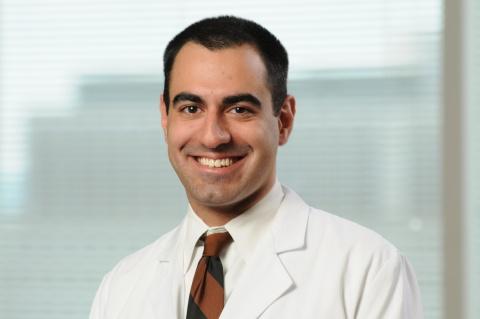
This story is part of an ongoing series of reflections from Duke Surgery faculty, residents, and staff.
The final year of residency holds many milestones. For general surgery administrative chief resident James Meza, MD, the COVID-19 pandemic significantly altered the last few months of his residency, but has also become a defining time in his career.
The role of an administrative chief resident is a busy one—a position that requires general leadership within the program and oversees the day-to-day workflow of the residents. When the spread of the pandemic became a reality in mid-March of 2020, work significantly changed for Dr. Meza and the other residents of the program.
“As the pandemic began to unfold and its severity became apparent, it really required us to wholesale rethink how the residency would work, and how surgery was going to perform at Duke,” he says. “We had questions about our schedules, about what resident involvement would be, what would happen if we were operating on patients with COVID-19. These questions were coming up in real-time and required a great deal of flexibility and coordination with the faculty.”
Leadership from surgical faculty, including General Surgery Residency Program Director John Migaly, MD, and Executive Vice Chair Cynthia Shortell, MD, was instrumental in making rapid and necessary operational decisions.
“Dr. Migaly and Dr. Shortell tasked me with organizing the residency so that we would perform the same high-quality patient care that we always have, along with being adaptable to circumstances as they arose and also to minimize the possibility of exposure to our residents,” says Dr. Meza. “That required a lot of flexibility and creative thinking.”
When elective procedures were postponed, Dr. Meza worked to implement a new platoon model: a reorganization with three groups of residents in a day team, a night team, and a reserve team. This model limited exposure of the residents to the virus while providing the same level of care to patients. To help with staffing, residents in their research year agreed to forego their protected laboratory time in order to assist with clinical work. Though the constant sea of change was stressful, Dr. Meza is grateful for the camaraderie of the residents and how they worked together during this time.
“This was a time like I’ve never experienced as a resident,” he says. “The residents were checking in on one another. We haven’t had one of us ill with COVID-19, but there were a few scares. We made sure that no one felt alone, or unsupported.”
Despite the hardships of the past few months, Dr. Meza says that the crisis has given the chief residents a chance to display their leadership skills they had worked to develop for years. It also gave them an opportunity to demonstrate their maturity and ability to make real-time decisions, a unique scenario that hasn’t been afforded to any other class.
“It’s bittersweet now, even for those that would finish their residency in normal times,” Dr. Meza says. “So many of the celebrations and the markers of the end of our residency, the transition into fellowships, have been missing. We know that adaptability is key. Celebrating the end of our program is not as important as the extraordinary circumstances we are in right now.”
Some important traditions will remain, such as having their professional portraits taken, signed, and hung on the gallery wall with past chief residents. Dr. Meza says the residents have joked that their photos will look unkempt, after 10 weeks without a haircut. Somehow though, it seems fitting.
“It’s just a sign of the times,” he says. “We’ll always be remembered as the class that went through this.”
Give to the Surgery Resident and Fellow Education Fund
The Department of Surgery has eight residency programs and seven fellowship programs that train surgeons who are dedicated to providing outstanding clinical care and contributing to advances in surgical care. A gift to the Surgery Resident and Fellow Education Fund will support the most immediate needs of the Department of Surgery, including a variety of educational and research experiences for our trainees.